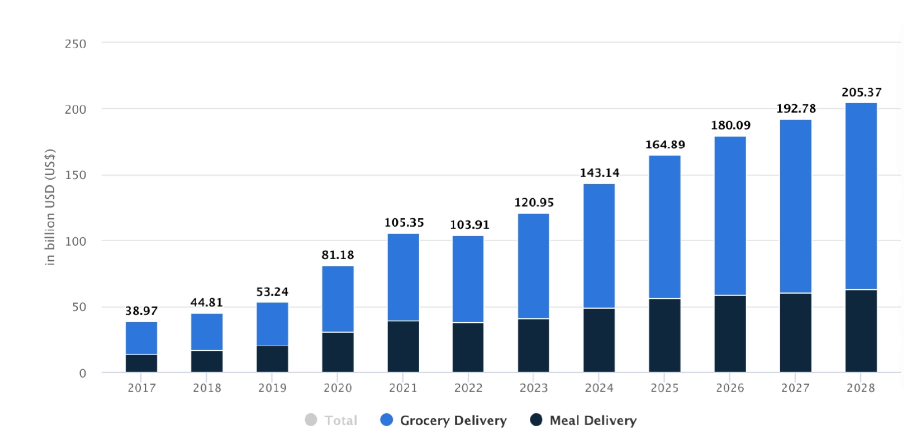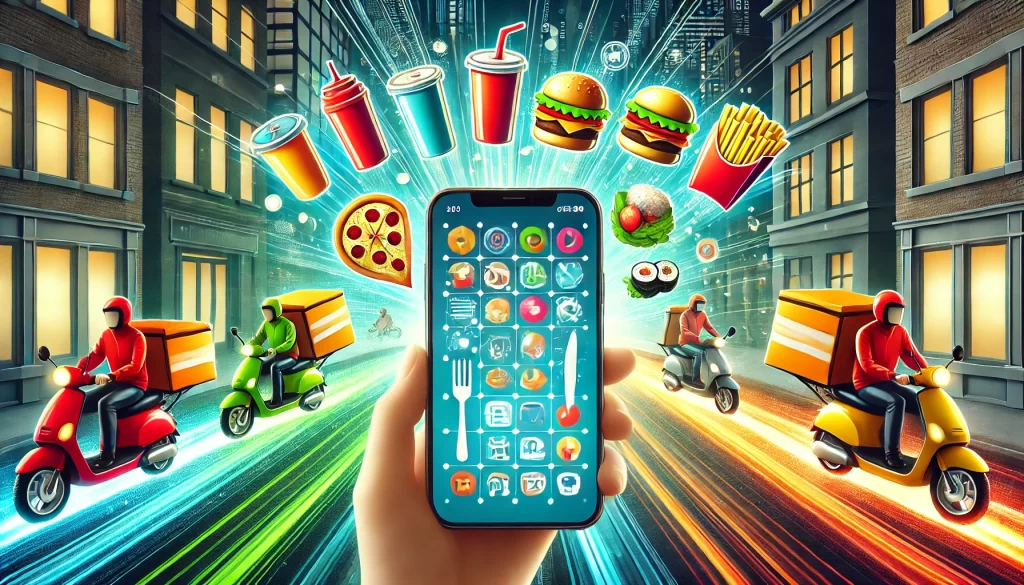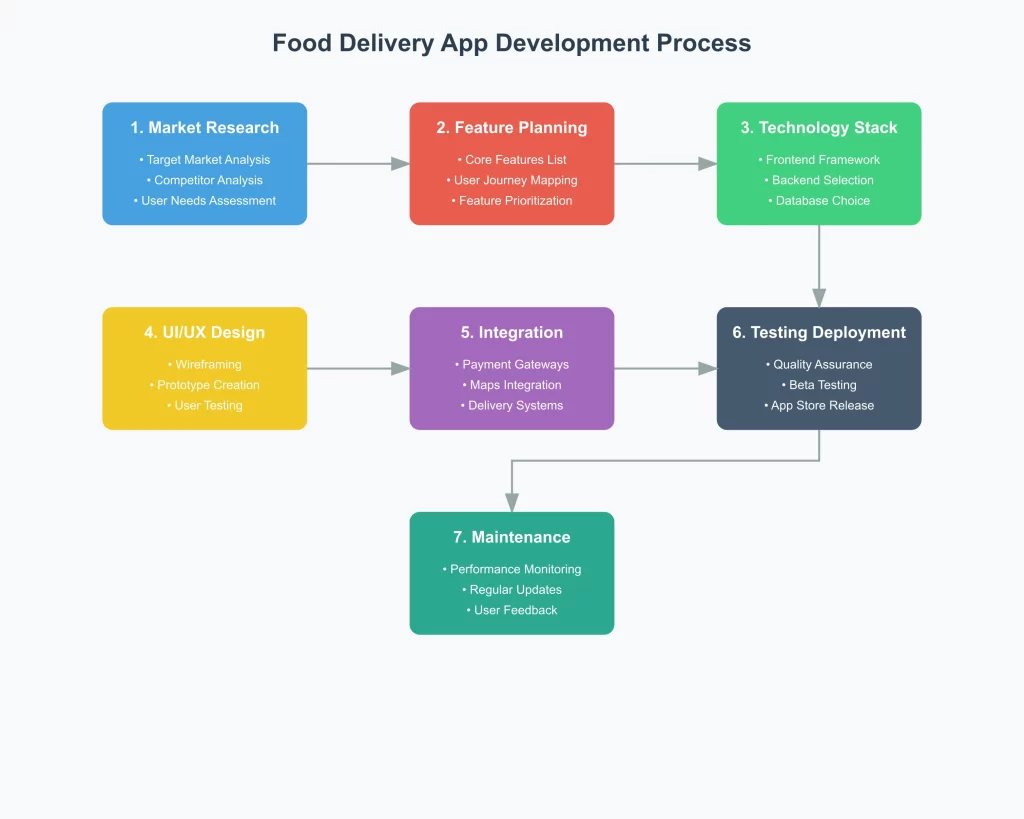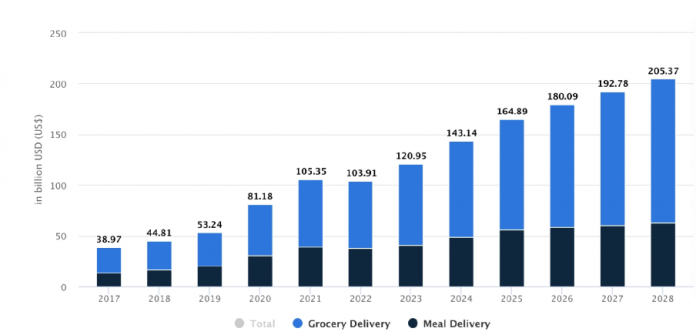The global online food delivery market was huge in 2022, worth US$323.30 billion. It is expected to hit US$466.20 billion by 2027, growing at 7.60% each year. With more people wanting food delivered quickly, companies are creating new apps fast. At Binary Informatics, we help our clients, stay ahead in this digital world.
We offer Digital Transformation Services to help business change quickly and on a large scale. We work with our clients to find and fix digital gaps. Our team uses a modular approach to analyze, implements, and deliver innovative products.
We help our clients from start to finish in developing food delivery apps. Whether you are new or already big, our expertise can help you grow. We make sure your app is efficient and meets your vision.
As per the report of Statista, the online food delivery market in Europe is projected to achieve a revenue of $205.37 billion by the end of 2028, witnessing a CAGR of 9.46% from 2024-2028. Thus, now is the right time for businesses looking to dive into the market and achieve maximum ROI.

The Rise of On-Demand Food Delivery Apps

The food delivery market has seen big change in recent years. Because people want easy access to food options. The global food delivery market now over $150 billion, up from just $50 billion in 2017.
This growth is mainly because of how people changed their habits during the COVID-19 pandemic. They started to prefer food delivered to their homes over eating out.
Read Also: The Ultimate Guide to Offshore Outsourcing with Binary Informatics
Changing Consumer Habits During COVID-19
When COVID-19 hit, the World Health Organization (WHO) advised people to stay away from each other. This led to fewer people eating out and more opting for delivery. In the US, the restaurant industry, which used to grow by 3-4% a year, saw a big shift towards delivery.
Delivery sales were growing at 7-8% a year, much faster than before. This change in how people eat has made food delivery apps more popular. In the US, the food delivery market almost doubled during the pandemic.
Growth of the Online Food Delivery Market
The online food delivery market is also growing fast. It’s expected to make $96,864.4 million by 2024. The number of users is set to go over 2.5 billion by 2027.
Investors are also showing a lot of interest in this market. Companies like Wolt, REEF Technology, and Rebel Foods have raised a lot of money. Big deals, like Uber buying Postmates and Just Eat Takeaway buying Grubhub, show the market is getting bigger.
The rise of food delivery apps during the pandemic has changed the restaurant industry. It has opened up new ways for businesses to reach more customers and make more money.
Understanding the Food Delivery App Ecosystem
Food delivery apps have changed how we get our meals. They connect us with local restaurants, making ordering and delivery easy. Knowing the key players and business models is key for anyone wanting to create a successful app in this field.
Key Players in Food Delivery Apps
The food delivery app world has several important roles:
- Customers – The people who order and get their food through the app.
- Restaurants – The local places that work with the apps to offer their food and services.
- Couriers – The ones who bring the food from the restaurants to the customers.
- Administrators – The team that looks after the app, its features, and how users feel.
Business Models of Food Delivery Apps
Most food delivery apps make money by taking a cut of the order value. They charge a percentage to the restaurant for handling the order and delivery. Apps like Uber Eats, Deliveroo, and Menulog are examples. They handle all the logistics, giving restaurants a sales solution without extra cost.
Apps also make money through subscription fees, delivery costs, and ads. As the market grows, companies are finding new ways to stay ahead.
People Also Likes To Read: Cost to Create An App in 2024 Decoded for Decision Makers
Benefits of Developing a Food Delivery App
Creating a food delivery app can bring many benefits to businesses in the food and restaurant industry. It lets them tap into the growing need for easy, on-demand meal delivery. This way, they can expand their customer reach and increase revenue opportunities.
Reaching a Wider Customer Base
Food delivery apps help businesses go beyond their physical locations. They connect with more people who want to order meals without leaving home or office. This can lead to a big increase in sales and profits.
Increased Revenue Streams
Food delivery apps also open up increased revenue streams for businesses. By adding delivery options, they stand out from competitors. They also benefit from the growing demand for on-demand meals.
Integrating mobile payments, loyalty programs, and special deals makes ordering more appealing. This can lead to more sales and loyal customers.
By using the benefits of food delivery app development, businesses can thrive in the changing food service industry. They can grow their customer base and find new ways to make money. The advantages of a good food delivery app are clear.
Food Delivery App Development: Step-by-Step Guide
Creating a successful food delivery app requires a detailed plan. It starts with market research and goes through app feature planning, technology stack selection, and more. Each step is vital for a smooth and enjoyable user experience. Let’s explore the food delivery app development process and the essential steps to make your app a reality.

- Market Research: Start by studying your target market and what people like. Look at other food delivery apps and their strengths and weaknesses. This helps you know how to make your app better.
- App Feature Planning: Decide on the key features your app needs. These include user sign-up, restaurant listings, ordering, payment, tracking, and reviews. Focus on features that make users happy and keep them coming back.
- Technology Stack Selection: Pick the best technology for your app. Think about scalability, integration, and maintenance. The right tech stack is key for a successful app.
- User Interface and Experience Design: Design an easy-to-use interface that makes ordering simple. Include features like location services, personalized suggestions, and notifications. This keeps users interested and engaged.
- Integration with Third-Party Services: Connect your app with services like payment gateways and delivery systems. This ensures a reliable and complete service for your users.
- Testing and Deployment: Test your app thoroughly to make sure it works well on all devices. Once it’s perfect, release it in the app stores and get ready for launch.
- Ongoing Maintenance and Updates: Keep an eye on user feedback and app performance. Make updates and improvements to keep your app relevant and competitive.
By following this guide, you can create a food delivery app that meets customer needs and stands out. Success comes from knowing your audience, providing a smooth experience, and always innovating.
Also Read: How to Find Best App Developers for Start-Ups?
Key Features to Include in Your Food Delivery App
Creating a top-notch food delivery app means adding key features. These features make the app easy to use and fun for customers. The must-haves include user registration, restaurant listings, and online ordering.
User Registration and Profile Management
Let customers create accounts and save their favorites. This makes ordering easier and builds loyalty. A smooth sign-up and good profile management are key.
Restaurant Listing and Menu Integration
Link your app with a big database of restaurants and menus. This lets users explore many options and order right in the app. It makes ordering simple and boosts satisfaction.
Online Ordering and Payment Gateway
A secure online ordering system is vital. It should be easy to use and offer many payment choices. This ensures customers can order confidently, leading to more sales and happy customers.
| Key Features of Food Delivery Apps | Benefits |
|---|---|
| User Registration and Profile Management | Enhances customer loyalty and streamlines the ordering experience |
| Restaurant Listing and Menu Integration | Expands customer choices and simplifies the ordering process |
| Online Ordering and Payment Gateway | Ensures a secure and user-friendly checkout process, leading to higher conversion rates and repeat business |
Technology Stack for Food Delivery App Development
Building a top-notch food delivery app needs a well-chosen tech stack. This includes everything from the front-end to the back-end and databases. Each part is key to a great user experience and making sure the app works well.
Front-end Technologies
For the front-end, React, Angular, or Flutter are top picks. They help make user interfaces that look good and work well on all devices. This makes the app easy to use and fun to interact with.
Back-end Technologies
The back-end needs strong server-side tech like Node.js, Ruby on Rails, or Python’s Django. These tools help the app handle user info, orders, and connect with other services. They keep the app safe and efficient.
Databases and Cloud Services
For storing data, MySQL or PostgreSQL are good choices. NoSQL options like MongoDB also work well. These databases manage data well, meeting the app’s needs.
Cloud platforms like AWS, Google Cloud, or Azure are also important. They provide the needed infrastructure and reliability for the app. Cloud services help with storage, computing, and databases, making the app scalable and reliable.
Choosing the right tech stack is key for app developers. It helps create a smooth and efficient app. This benefits both customers and restaurants, helping the food delivery business grow.
Food Delivery App Development: From Concept to Launch
Creating a successful food delivery app is a detailed journey. It starts with a concept and ends with a launch. Each step is important for making an app that people love and stands out in the market.
We start by doing deep market research. This helps us know what people want and who our competitors are. With this knowledge, we design an app that is easy to use and looks great.
Choosing the right technology is a big step. We pick the best tools for the front-end, back-end, and database and We also make sure the app works well with payment systems and logistics.
We work closely with restaurants and users during development. This ensures the app meets their needs. We test the app a lot to make sure it’s top-notch before we launch it.
When the app is ready, we promote it to get users. We use app stores, social media, and ads to reach people. This helps us get more users and grow the app.
Building a food delivery app is a challenging but rewarding task. It needs a deep understanding of the market and a focus on innovation. By following this approach, we can make sure our app does well and keeps improving.
Challenges in Food Delivery App Development
Creating a top-notch food delivery app is tough. It needs a great user experience and interface design. Also, integrating third-party services smoothly is a big challenge.
User Experience and Interface Design Challenges
For a food delivery app to succeed, it must offer a smooth user experience. Customers want to track their orders in real-time and navigate menus easily. They also expect a simple payment process.
Creating such an app requires knowing what users like. It also means making the app easy to use, despite its many features. This is a big task, as apps need to handle a lot of tasks well.
Integration with Third-Party Services
Integrating third-party services is another big challenge. This includes mapping, payment systems, and restaurant management tools. These services must work well with the app for a good user experience.
Dealing with API integrations, data syncing, and security is hard. But, it’s key to making the app reliable and efficient.
Beating these hurdles is vital for a food delivery app to succeed. Focus on user experience, use the right tech, and ensure smooth integrations. This way, developers can make an app that truly adds value and lasts.
Read Also: How Much Do Indian App Developers Really Cost?
Food Delivery App Development Costs
Creating a food delivery app is exciting, but knowing the costs is key. Prices can vary, from $50,000 for a simple app to over $300,000 for a feature-rich one.
Several things affect the cost of developing a food delivery app. These include the app’s complexity, needed features, technology used, the team’s skills, and the platforms it will run on.
Now, let’s look at what factors affecting food delivery app development cost:
- App Complexity: More complex apps cost more. Features like real-time tracking and loyalty programs add to the price.
- Technology Stack: The tech used can greatly affect costs. New technologies might be pricier but offer more benefits.
- Custom Design: A unique design improves user experience but increases costs.
- Third-Party Integrations: Adding services like payment gateways and delivery tools can raise costs.
- Maintenance and Updates: Keeping the app updated adds 15-20% to the initial cost each year.
For a successful food delivery app, planning and budgeting are critical. Knowing the cost of developing a food delivery app helps businesses make smart choices and use their resources wisely.
Though starting costs are high, a good app offers many benefits. It can improve customer service, streamline operations, and tap into the online food delivery trend. This can lead to new income sources and a market advantage.
Marketing and Promoting Your Food Delivery App
Marketing and promotion are key for a food delivery app’s success. The online food delivery market is growing fast. It’s expected to reach 1.4 trillion U.S. dollars by 2027, says Statista. You need strategies to make your app stand out and keep customers coming back.
App Store Optimization (ASO)
App Store Optimization (ASO) is vital for marketing your app. By tweaking your app’s title, description, keywords, and visuals, you can get more visibility. Paid ads on the Apple App Store can boost your app’s downloads by 50%.
Social Media Marketing
Social media is a strong tool for promoting your app. People spend 151 minutes daily on social media in 2023. Platforms like Instagram, Facebook, and TikTok are great for reaching users, building your brand, and driving downloads. Working with local influencers can help you reach specific areas or groups.
Don’t forget about email marketing, which beats other strategies by 92% when sending offers. Making ordering fun, celebrating virtual food festivals, and using AI for marketing can also keep users engaged.
To market your app well, know your audience and tailor your strategies. Keep improving your approach to stay competitive.
People Also Likes to Read: 16 Tips to Find Best Mobile App Development Company in India
Future of Food Delivery Apps
The future of food delivery apps is looking bright, thanks to new technologies and changing tastes. The global food delivery market is expected to hit $34.68 billion by 2024. It could even reach $71.63 billion by 2027. This growth will bring big changes in how we order and get our food.
Artificial Intelligence and Machine Learning
Artificial Intelligence (AI) and Machine Learning (ML) will be key in the future of food delivery apps. They will help make recommendations, improve routes, and make the app better for users. AI will guess what customers want and when, making deliveries quicker and more accurate.
AI chatbots and virtual assistants will also make ordering easier. They will help users in real-time, making the whole process smoother.
Drone Delivery and Robotics
Drone delivery and robotics will change how food gets to our doors. By 2025, there will be 2.11 billion customers for these services. This means we’ll need faster and more reliable ways to get our food.
Drones and robots will help by cutting down on the need for human drivers. They will make food delivery faster and more reliable.
These new technologies, along with the rise of on-demand food delivery, will keep the industry growing. The apps that stay ahead of these changes will lead the way in this fast-paced field.
Food Delivery App Development Company
At Binary Informatics, we see the huge chance in the food delivery app market. As a top food delivery app development company, we have the skills and tools to help businesses of all sizes. We create innovative and easy-to-use food delivery platforms that shine in the competitive world.
Our team of skilled developers, designers, and strategists work hand in hand with our clients. We offer top-notch food delivery app development services. We cover everything from market research and strategy to user experience design, technology, and ongoing support. This ensures your food delivery app’s success.
- We use our industry knowledge to make a food delivery app that meets your customers’ needs and beats the competition.
- Our portfolio shows we can create tailored solutions for any client, from small local restaurants to big national chains.
- We focus on the latest technologies and user-friendly design. This helps you build an app that’s easy and fun for your customers.
- We’re dedicated to great customer service and ongoing support. This keeps your app updated, secure, and running smoothly.
If you want to make a new food delivery app or improve an existing one, our top food delivery app development services can help. We’ll help you reach your business goals and stay ahead in the fast-changing food delivery market.
Conclusion
The food delivery app industry has grown a lot, thanks to changes in how people shop and the COVID-19 pandemic. To make a great food delivery app, you need a solid plan. This includes knowing the market, picking the right features, and choosing the best technology.
It’s also key to focus on making the app easy to use, work well with other services, and keep it interesting through marketing. This way, your app can stand out and meet what customers want now.
New tech like AI, machine learning, and drone delivery will change food delivery apps even more. These changes could make apps better and more exciting for users. The online food delivery market is expected to grow a lot, with big numbers in the next few years.
To succeed, we must keep up with new tech, design apps that users love, and understand what people want. The future of food delivery apps looks bright, and we’re ready to make the most of it.
FAQ
What are the key benefits of developing a food delivery app?
Food delivery apps help businesses reach more customers. They tap into a growing market of people who want food delivered quickly. This also opens up new ways to make money.
Customers get to choose from many meals. They can order from top restaurants without leaving home or work.
What are the core features that should be included in a successful food delivery app?
Good food delivery apps have key features. These include letting users sign up and manage their profiles. They also need to show restaurant menus and take orders.
They should have a way to track orders in real-time. This keeps users updated on their food’s journey.
What technology stack is commonly used for developing a food delivery app?
To make a great food delivery app, you need the right tech. On the front-end, React, Angular, or Flutter are popular for making user-friendly interfaces.
For the back-end, Node.js, Ruby on Rails, or Django are strong choices. They handle the app’s functionality well. Databases like MySQL or MongoDB store the app’s data.
Cloud platforms like AWS or Google Cloud provide the app’s infrastructure. They ensure the app works well and can grow.
What are the key challenges in developing a food delivery app?
Making a good food delivery app is tough. You need to design an easy-to-use interface. It should also work well with other services like maps and payment systems.
Connecting the app smoothly with these services is key. It ensures a seamless delivery experience for users.
How much does it cost to develop a food delivery app?
The cost of a food delivery app varies. Basic apps can cost between $50,000 to $150,000. More advanced apps with extra features can cost over $300,000.
Designing the app yourself or adding extra features can increase costs. Ongoing updates also add to the expense.
What are some effective marketing strategies for a food delivery app?
Marketing is vital for a food delivery app’s success. Improving visibility in app stores is important. Social media marketing helps too.
It builds brand awareness and encourages downloads. Platforms like Instagram and Facebook are great for this.
What is the future outlook for food delivery apps?
Food delivery apps will evolve with new tech and changing tastes. AI and ML will make apps smarter. They’ll offer better recommendations and improve delivery efficiency.
Drone and robotics technology could change delivery. It could become faster and more efficient, reducing the need for human drivers.
What should businesses consider when choosing a food delivery app development company?
Choosing the right company is important. Look at their experience, success stories, and tech skills. They should offer a solution that fits your business needs.
Working with an experienced company can help. They have the knowledge and resources to create a successful app.

